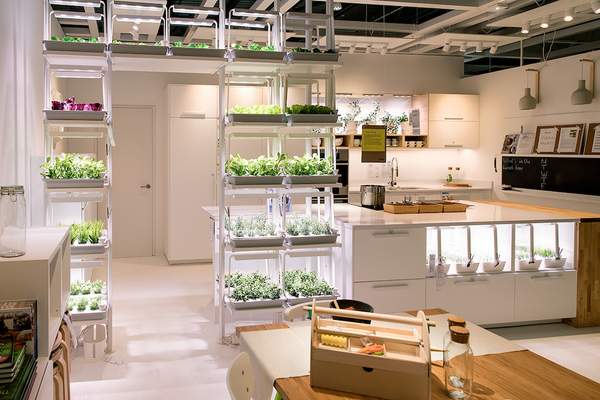IKEA is a global pioneer, from selling almost everything you come possibly imagine to encouraging consumers to build their own furniture and providing hilarious instruction guides. On Warehouse News we discussed their efforts to make their stores across the UK dust-free through filtration technology. Now they’re at it again, pioneering their first sustainable store in the UK.

The Evening Standard reports that the world-renowned store’s Greenwich branch incorporated renewable materials in its construction. It uses solar panels to generate green power and can easily be accessed by foot, bike, and even boat. It has a wildlife centre for bats, birds, and all sorts of bugs, as well as a rooftop garden that customers can access.
In lifestyle and travel journalist Laura Ivill’s review, she highlighted how the store asked all their staff (and even their customers) to arrive to work via public transportation—one great way to reduce gas emissions. “The ambition of the company is to have a closed loop of production by 2030, whereby all raw materials will be sustainably sourced and everything they produce can be reused or recycled,” she wrote.
IKEA isn’t the only company in the home and gardening retail industry that has started moving towards sustainability. Home improvement retailer Kingfisher is another, with their plans to phase-out three potentially harmful chemical groups in its own branded products by 2025. Kingfisher’s head of sustainable chemicals management, Paul Ellis acknowledges that the company’s goal takes time and requires collaboration across the global value chain. “We have developed our Chemicals Roadmap to provide customers with sustainable products that respond to their desire for fewer and less harmful chemicals in their homes, while continuing to stay ahead of regulation and lead on sustainable chemical management in Europe,” he said. The chemicals will be removed from more than 1,300 Kingfisher-owned stores in Europe. This includes the B&Q and Screwfix outlets in the UK. In fact, the Screwfix store in Peterborough already uses solar power from its roof, combined with air source heat pumps.
This just proves that the industry is aware that the demand for sustainable and long-lasting products is on the rise. It used to be that companies looking to be more environmentally-friendly concentrated their efforts on manufacturing and logistics. Now, more and more companies are considering the end-to-end approach to sustainability, from the moment the product hits the market, up to the moment the consumer disposes of it. IKEA and Screwfix among others, make sure the products they produce are of good quality and are long-lasting. This can often be seen through the manufacturer’s guarantees that now accompany products. The garden fence panels listed on Screwfix show how many come with manufacturer’s guarantees of over 10 years—saving the consumer money and reducing the need for companies to manufacture more. The mattresses available in IKEA can last up to 25 years, while their cookware and knives can last 15 years—the longer a product lasts, the better it is for the environment.
Kingfisher has also opened its first net zero energy store, which is powered by a combination of solar battery storage and air source heat pumps. They produce just the right amount of power as the store needs with the excess going into the grid. Kingfisher’s head of energy and renewables Jeremy Parsons says being able to create a zero energy store is a huge milestone: “Pulling them into one project at Screwfix demonstrates how far we can go towards creating very low carbon stores.”
Outside of the UK, other companies are following suit, too. Refiner and chemicals giant Total has started using recyclable polymer packaging made from at least 25% recycled household waste from Western Europe. Meanwhile, Spanish multinational clothing company Inditex has signed an exclusive agreement with Austrian fibre supplier Lenzing for the production of premium textiles from fabric waste, with them expecting to be able to produce more than 40 million garments with this material.
All these efforts just prove that the movement to improve the condition of the environment are well underway, with experts hoping the benefits will be evident in the near future. Hailey Baines-Buffery of Bioregional told Ethical Corporation that many CEOs are very aware of their corporate responsibility and many retailers are already investing on resources that can build internal sustainability. “Given the pressures we are already placing on our planet, consuming three times as much as we do today is not an option. So if we are to achieve a prosperous future for all within the limits of the Earth’s resources, we need to start unleashing business innovation,” she said in the interview. She also notes that adopting a new business model is necessary to be able to sustain air, water, and land resources as well as support human wellbeing.




Comments are closed.